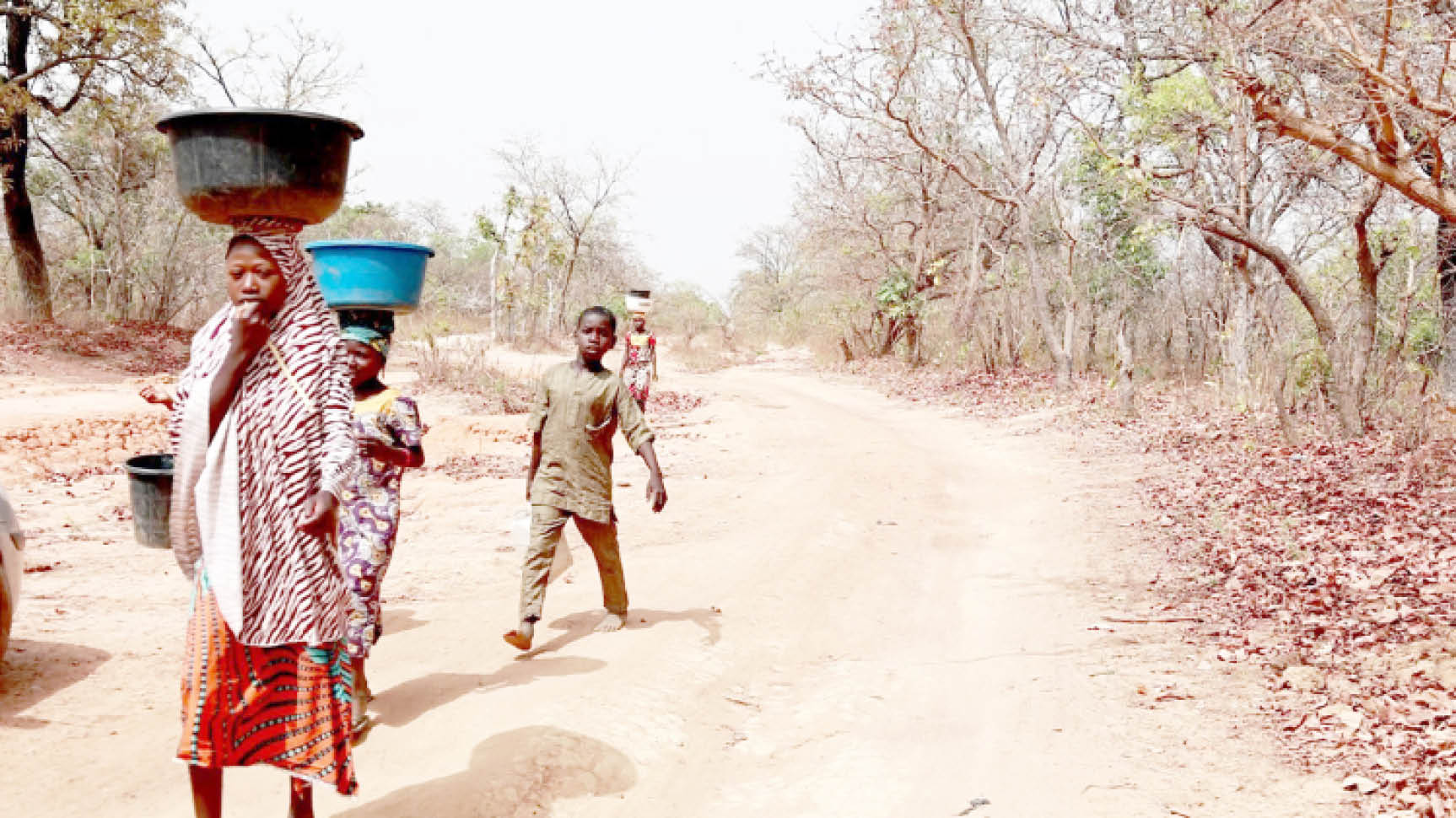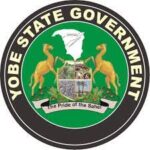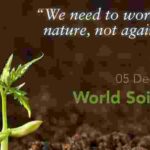Every Saturday, a popular market comes alive in Kaiama, a farming community in Kwara State. Dawn reveals lively women expressing themselves in Bokobaru, the language of the area.
Women alight from motorcycles with large basins filled with yellow shea-butter, having travelled along a number of rural roads to get to Kaiama early enough before the butter starts melting.
Nigeria host to 3.2m displaced persons – UN
Brain drain: Who is to blame for the mortal exodus of Nigerian doctors?
Timing is important in the butter trade. Very soon a young woman walks through part of the market with a mould of shea-butter placed on her head. It is a form of advertisement for the butter. A mould of butter costs N2,000.
Buyers of the product travel from Ibadan, Ilorin, Lagos and other distant places each week. The resilience of the women and their capacity for hard work are qualities to be admired in a promising but neglected community encircled by hundreds of kilometres of bad roads and collapsed bridges. In Kaiama, the rugged Mazda Premacy is the car most favoured by many locals as they navigate the failed roads.
Awesome collapse
The failed section at Tungan Maje, along the Kaiama-Wawa road, is an awesome sight, even in its state of collapse. In the annals of failed federal roads, never has collapse been so total and absolute. You would almost think a massive hand had torn out a section of the road and taken it away as a kind of giant trophy made of concrete, mud and sand. In order to navigate this portion of the road, drivers in cars heavily laden with passengers, goods and commodities, and sometimes cows, have to descend into the nearby valley when coming from or going to Wawa. They drive upwards for a while to connect with the road they had just left. Meanwhile, there is no proper sign indicating that a part of the bridge has disappeared, making the spot a death trap of sorts, especially at night. This is everyday life for the locals who travel along the Kaiama Wawa road.

‘Farms are in the bush’
Ahmad Ibn Mohammed, the articulate Kiwazi of Wazibe, explains in some detail, the experiences of the average farmer in Kaiama. “Today is Kinikini market and a lot of people are on the way coming. Before they get to the market it will be around 2:00 pm because of the distance from their farms. They farm in the bush, at a far distance.
“Instead of the revenue coming to the coffers of the local or state government, our people prefer to move to the nearby Benin Republic with their goods.” He said, adding that huge losses are suffered by the farming population every day.
Country roads too
“Bad roads are not limited to trunk A roads. The roads from villages to farms are even worse than these places. Last year, for about two months, I was not able to go to my farm. It was cut off by flood waters. The inability to get to the farm is a major problem for us because farming has a method. There is a way you go about farming. You don’t just go into the bush to plant and that’s all.
“Farmers find it difficult to move their goods from Kaiama to other places where they can market their products. We grow yams here in large quantities. Kaiama happens to be number one in yam flour production in Nigeria. When the rains start, farmers find it difficult to move yams anywhere. We localise it. By implication, you sell it at a give-away price. It is the middlemen that determine how you sell it or they will not buy.
“I lost all my rainy season yams. Ideally, I am supposed to uproot some during the season and eat so that it would reproduce for planting, but I was not able to go.
“The maize that ripened earlier got soaked in water and virtually half of them got spoilt. The inability to get to the farm in the rainy season is a major problem for us,” Umar Aboki, the chairman, All Farmers Association of Nigeria (AFAN), Kwara State said.
Gully erosion
At a nearby spot, gully erosion is already claiming part of the road, and there are fears that it will widen and deepen by the time the rains intensify. Large sections of the road are threatened, and it is likely that similar conditions created the huge collapse at Tungan Maje.
It was learnt that a security operative drove into the gully one night and perished instantly. The gully extends for a considerable
length and the drone captures the length of it. It is a living sign of the danger to come. At some distance from Tungan Maje, another smaller bridge also suffered a collapse, which makes drivers to effect a diversion at the spot. This bridge is located at Wurumakoto village.

‘Trucks sink’
The entire communities are cut off whenever there is a flood. “Sometimes we spend four to five days before we get to Kisi in Oyo State during the rainy season. This is because of bad road network. The road will be completely blocked. Sometimes most of our trucks will sink. If one truck sinks, the one that’s coming cannot pass. The one that’s coming from Kisi down to Kaiama cannot also pass,” Ibrahim Shiyaki of the National Union of Transport Employees said.
Passion for butter
Women are a potent group in Kaiama’s shea-butter economy. Almost every house in the Kibefandi part of Kaiama is involved in the shea-butter processing business.
Shea nuts are seen spread on the ground to dry after they have been picked in the neighbouring area where the trees grow wild and are present in great numbers.
From time to time, women sit outside houses, holding the sticks they use in breaking the nuts. A number of houses have machines for the grinding of the shea nuts, which are soon transformed into a paste after an intensive process. Elderly women train the young girls in the age-old method of processing the shea nut into the much sought-after butter. At the processing centre, young girls play roles in making the butter from dawn till early evening. Sometimes a woman with a baby strapped to her back bends to knead the paste with her bare hands for many minutes. Slowly, after much exertion, the paste begins to whiten. It will soon be ready for boiling in huge pots.
Fertile soil
Kaiama is blessed with fertile soil and a hardworking farming population. The locals do not need to make use of fertiliser as the land yields richly all year round.
Mohammed revealed, “In Wazibe, we are into guinea corn, maize, soybeans. I don’t think any other community in the whole of Nigeria produces the kind of soybeans we have in this community. We are aware that on a daily basis, 10 to 15 trailers convey soybeans out of Kaiama.”
He laments the losses suffered by farmers, saying, “Farmers end up not getting much because of the cost of transportation. Even if you want to use a motorcycle, it can easily get damaged. It is easier to move during the dry season. When it comes to the rainy season, it is a tug of war because when you get to some places you wait and get people to help you push your vehicle. This affects the economy of the area in every way.”
Six months only
Bad roads impact negatively on vehicles driven within the community. Abdullahi Yusuf, the chairman of the National Union of Road Transport Workers (NURTW) in Kaiama said, “Premacy costs N2m, and after six months it will start giving you problems because of bad roads. You will enjoy it for six months and that is all. This is what we experiencing. If the three federal roads can be fixed, Kaiama can feed the country.
“Every week, you have to service your car, which costs between N70,000 to N75,000. You have to buy oil, as well as replace the shock absorbers. There are four shock absorbers in the car and each one costs N15,000.”
He also said drivers would waste a lot of hours on the various routes around Kaiama. “During the rainy season, if you leave Ilorin by 6:00 am before you arrive at Kaiama it will be 2:00 pm. New Bussa is less than one hour if the road is in good condition, but now you drive for three hours or more. Kusobosu is a 50-kilometre journey, which should be less than an hour, but from Kaiama to Kusobosu is a seven-hour trip.”
Banditry
Insecurity is a lingering problem. The presence of bandits in some of the forests has since been confirmed. Umar Bio Saliu, the chief of Woro said, “If there is any challenge here and we need assistance from the army or police, it takes them a lot of time to get here.”
Yakubu Saliu, the village head of Gwaria, also said, “Roads also boost security network. When the road is bad and we have any security challenge, when we report to the police it will take them a while to get to the community and arrest the situation.”
Speaking on the condition of his people during the rainy season, the chief of Woro said, “We transport most of our farm produce from here to New Bussa and Kaiama. During the rainy season, people coming from one direction would have to transfer their goods from one vehicle to another at the bank of the river because vehicles cannot cross.”
The farming folk of Kaiama can write books on their plight at the height of the rainy season.
‘Ideal for a university’
Alhaji Mu’azu Omar, the Emir of Kaiama, also told Daily Trust on Sunday that, “This is an ideal place for a university. All the things needed for a university are here, including land. The forest here is bigger than that of Sambisa in Borno. There is also a large Kainji lake.
“To develop a country or society, you need capital input to improve local communities. If we had resources to process our produce further rather than carrying them raw, it would definitely assist.
“Most of the roads in rural areas are very bad. Farmers have to contribute money because the road infrastructure leading to those areas is virtually gone.”
‘Endowed with everything’
The royal further insisted that “Kaiama is a food basket, not only of Kwara, but this part of the North West and North Central. It is endowed with everything, both root and cereal crops. The climate is favourable. Most of the rice we grow here is taken to Kebbi and Niger states. Yam is transported to Jega and Sokoto. We are endowed with everything.”
The emir also said that throughout the year, the fertile soil in Kaiama would attract huge populations across Nigeria. “Every year, people migrate to this place from the North during the dry season, and vice versa. Due to crisis in the North, a lot of cattle migrate to this side, causing a lot of disharmony between farmers and the herdsmen. I had to instruct my village heads and ward heads to settle their disputes. And they should, as much as possible, not go to the police because of a daily occurrence,” he said.
On the problem of bad roads, the emir, who is also a retired permanent secretary posited, “We are always unlucky when it comes to road projects. The first major road that was awarded was from Kaiama to Wawa. It was awarded in 1972/1973 during the military era. It took 15 years. It was Buhari/Obasanjo who terminated the contract and awarded it to another in 1985. The road is now worse than before. If you are going to New Bussa you will spend a minimum of four hours for a journey of less than 60 kilometres.”

Numerous diversions
Along the Kaiama-Kusobosu road are numerous diversions created by motorists because the basic road itself has failed and can no longer be navigated. There are parts of the road that have completely vanished and vegetation has taken over. Just by River Sumah, the road has been taken over by trees and there are diversions. This is a very common feature along the road, which should be an international highway as it leads to the border with the neighbouring Benin Republic.
N300,000 to hire a bulldozer
Mohammed said, “The only thing we can do is to grade some of the rural roads ourselves. Recently, a senator and the member representing us at the House of Hssembly assisted in some roads within the community. We too, as a community, graded some roads. We spent between N5m and N6m to do so, particularly from here to Nanu.
“To rent a bulldozer for a day, the charge is N300,000. That is a huge amount. It has not been easy for us. We have a lot of rural roads that need to be graded.
“Our communities are rural. So, sometimes farmers don’t bring their crops here. They take them to Benin Republic because they feel the rural roads that link them to Benin are closer or graded.”
Adding value
“If we had a system where the raw crop is processed or semi processed, it will add value to it. Instead of carrying the raw shea nut, people come and buy it for export. That’s why it is very expensive. They go to the farms and pay in advance. If rice is milled and processed half way, there will be full value for the community. We need to set up a system that processes all these agricultural produce. It will add value,” the Emir said.
Canoe tax
Alhassan Aminu, a farmer, spoke on the steps the locals at Gwariawizi take each rainy season when the river fills up.
This is an excellent farming country which has a number of rivers and streams and lies off the Kaiama Kisi road. A number of large privately owned farms crisscross the area. We get to one and witness the ongoing cassava harvest. It is an impressive sight and a trailer is slowly being filled. One road passes through the valley and it connects many communities lying on both sides of it.
In the rainy season the river fills up and the entire villages are effectively cut off except they contribute money to buy a canoe. The contribution to buy a canoe is done every year, and it is akin to an annual tax.
Aminu said, “During the rainy season, the river becomes full with water and people find it difficult to cross. The people of Gwariawizi contribute money to buy a canoe, which cost N60,000 last year. This year, we are contributing money to buy a canoe, which now costs N100,000.”

‘Stuck for 2 months’
He drew attention to the predicament suffered by the people, saying, “We will be stuck here for two and a half months between August and October if we don’t have a canoe.”
The canoes are used to transport farmers, agricultural produce, as well as motorcycles from one point to the next, a familiar pattern throughout much of Kaiama during the rainy season.
Symbols of neglect
When Daily Trust on Sunday visited, the river was still, the trees forming a natural canopy above it, bathing the place in a green light, with sunlight penetrating from time to time.
There were signs that water rises to the very top of the deep valley at the height of the rainy season, meaning that the valley is absolutely full at the height of the rainy season.
A disused canoe sat within the river bed, confirming the information on the canoe tax provided by the farmer. Dry and fresh leaves surrounded it like silent symbols of life and death.
Another canoe, also used a while ago, was at a height much further on, lying on one side and forming another emblem of neglect and abandonment.
No banks in Kaiama
Aboki complained about the role played by the middlemen in Kaiama. “Farm produce are monopolised by middlemen, who are at a vantage position to move it.
Market forces are not allowed to determine the prices of commodities, thereby inflicting hardship on the common man.
“Economic activities have not been able to thrive in Kaiama. We don’t have a bank; we only have cash points. Banks do not agree to ply these roads with their facilities because of the danger it portends. If you don’t have access roads, no company will want to site their industries here because they will be at the risk of being attacked,” he said.
In Gwetekuta, Kugizi, Banisunlla and Bezira, few villages surrounding Kaiama with large farming populations, the cycle begins again: women are busy picking shea nuts and getting ready to process the harvest in preparation for the colourful Saturday market at Kaiama.

 Join Daily Trust WhatsApp Community For Quick Access To News and Happenings Around You.
Join Daily Trust WhatsApp Community For Quick Access To News and Happenings Around You.


